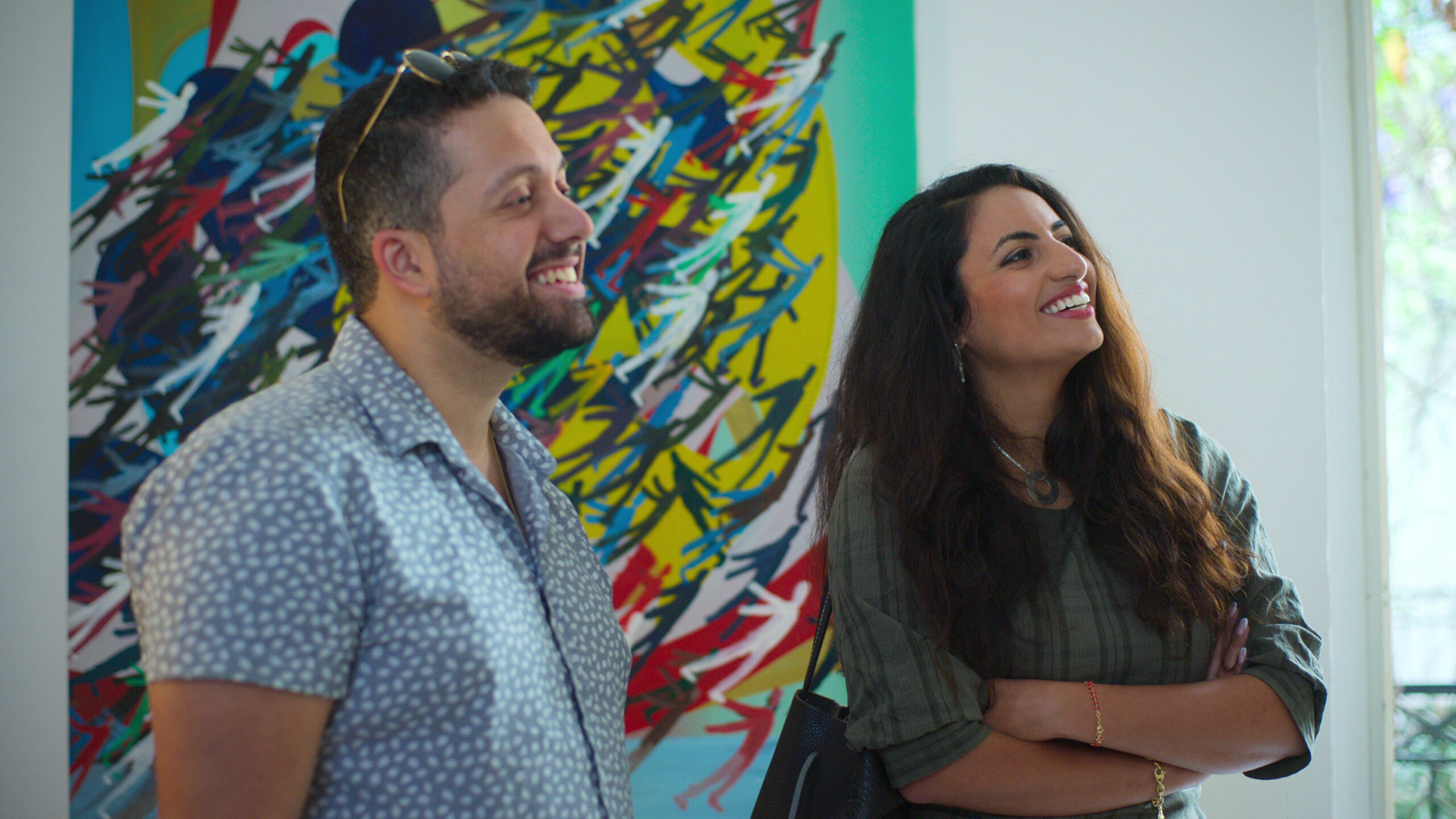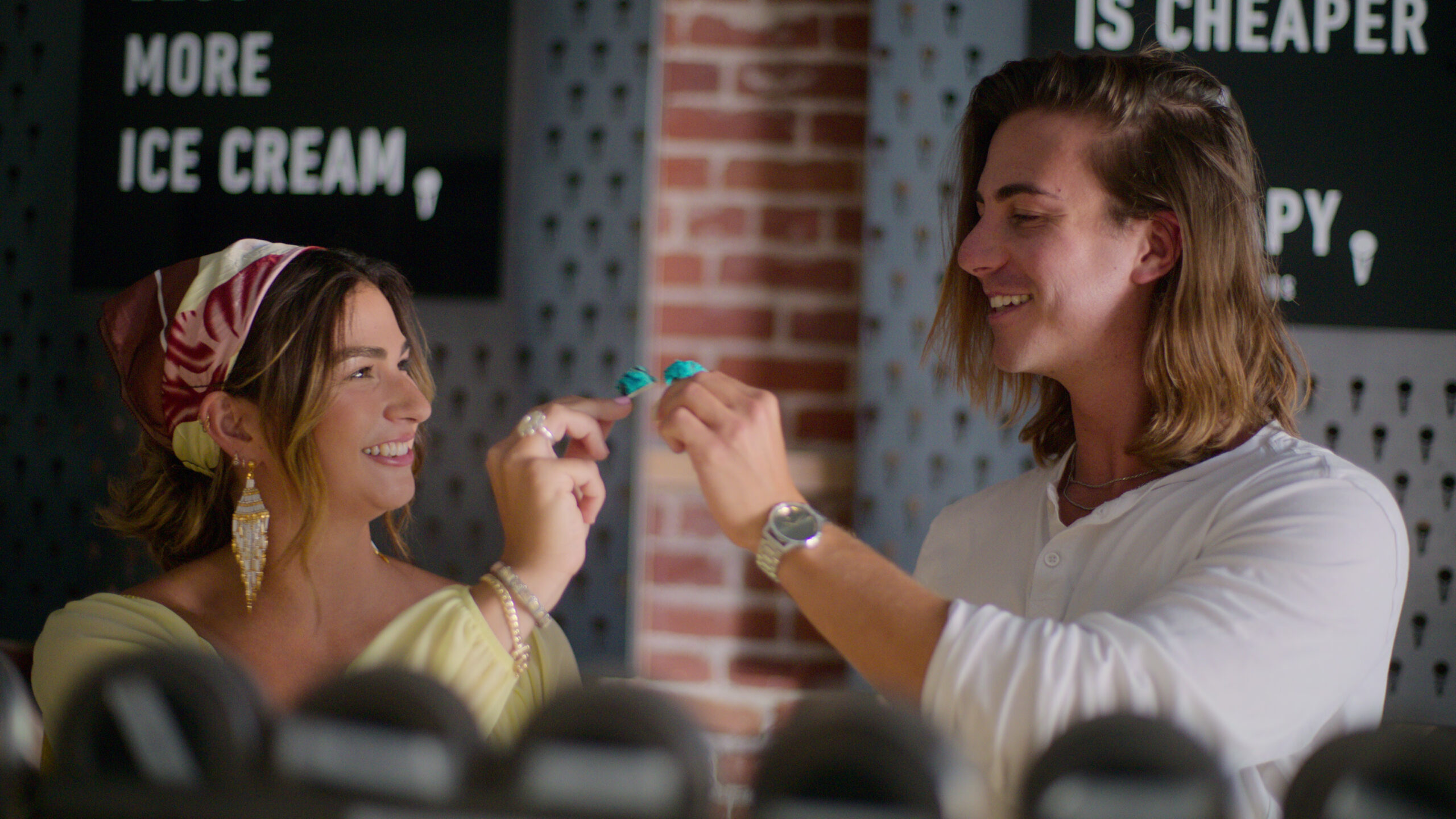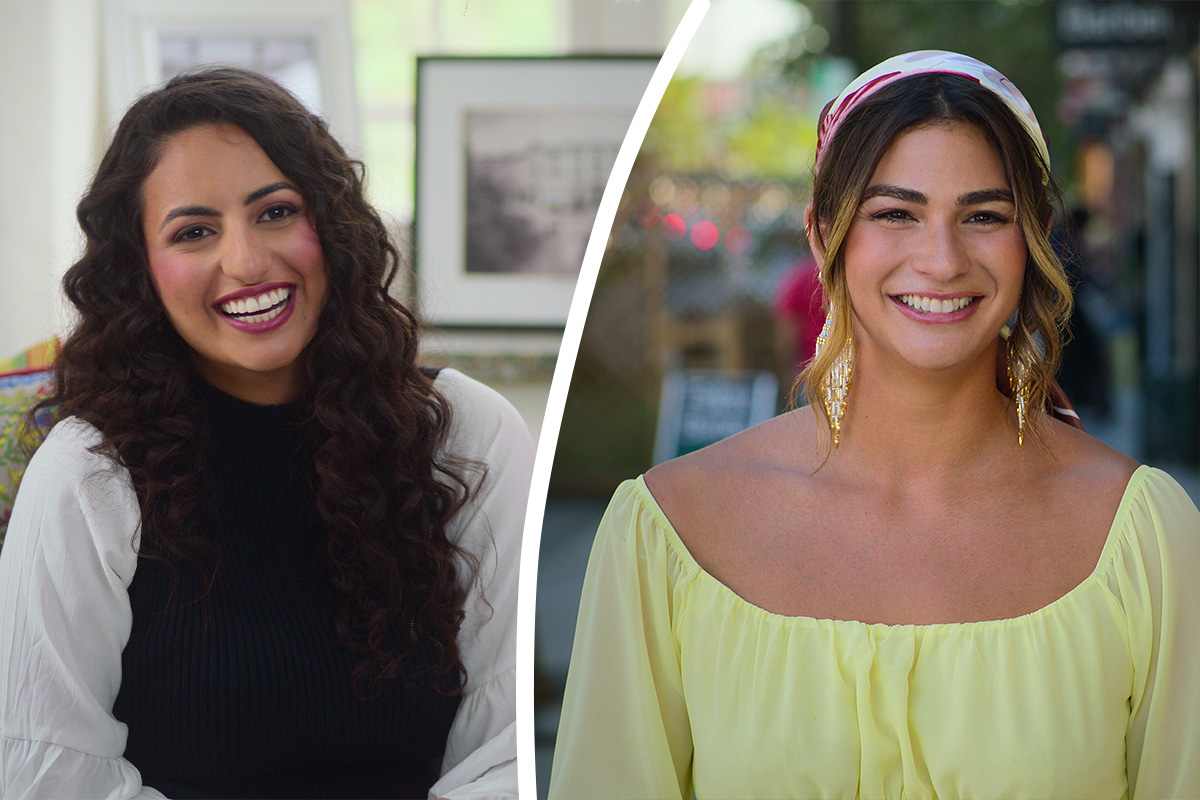Spoilers ahead for “Jewish Matchmaking”
There’s a lot to love about “Jewish Matchmaking” on Netflix, but I would argue that its greatest quality is its cast. Helmed by professional matchmaker Aleeza Ben Shalom, the group is as effervescent as it is varied: The featured love-seekers come from Ashkenazi, Sephardi and Mizrahi backgrounds and from locations across the United States, Israel, Europe and Africa. They range in age from early 20s to mid-40s and display a wide array of Jewish religious observance.
In an interview from earlier this week, Aleeza told me that she didn’t have a favorite among her clients on the show. And though I tend to agree with her, Cindy Seni and Dani Bergman are undeniable standouts, shining through as independent-minded Jewish women who aren’t afraid to tell men what they really think.
Viewers are first introduced to 27-year-old Dani, a fun-loving Miami girl who wants a man with strong eyebrows. Later, we meet 28-year-old Cindy, who, despite having gone through a recent breakup, is looking for a guy who both values tikkun olam and has abs. Then, we follow along as Aleeza sets Dani up with David, a 31-year-old CPA and president of the Miami Sephardic Club, and later Shaun, a gorgeous and personable Jewish guy from Hawaii; she sets Cindy up with Daniel, a 34-year-old tech engineer from Tel Aviv.
Recently, Cindy and Dani caught up with Hey Alma to dish about their matches, what Aleeza taught them and why tefillin is sexy.
This interview has been lightly edited and condensed for clarity.
How did you come to be on “Jewish Matchmaking”?
Cindy Seni: Surprisingly, they found me on Instagram, @israelwithcindy. They encouraged me to apply, so I did. I had just come out of a very long-term relationship. So I applied kind of as a joke for myself. I was like, “I’ve got nothing to lose. I’m going through this breakup anyways, so we might as well have fun.” And then all of a sudden, it became quite serious.
Dani Bergman: When I first moved to Miami, I joined a Facebook group that was called something like “Jews in South Florida” as a way to make some new friends and see what was going on in the community. I saw a posting on there that said, “casting single Jewish singles for a big show.” I applied for it just for fun, and then randomly, I want to say four months later, the casting people called me. They were like, “Hey, this is so-and-so from ‘Jewish Matchmaking.’ Do you have some time to chat?” It was a super quick connection, and then I ended up on the show.
Had you worked, or considered working, with a Jewish matchmaker in the past?
CS: I really did not like matchmaking before. I felt like a lot of times, I wasn’t being heard and listened to in what I wanted. So when I found out about [the show], I said, “OK, let’s see if this will be any different from my past experiences.”
DB: No, I had not. The opportunity just came my way and I couldn’t pass it up. Dating in the modern world is really hard, and dating apps make things really impersonal. I think anything that comes as a result of a referral — in any capacity: business, life, relationships, everything — has the potential to be strong. And I think for anyone that’s single and wanting to find someone, to have someone be like, “Here you go! Here’s a matchmaker…” I couldn’t say no.
On the show, you both talk briefly about your Jewish background and identity. Could you tell me a little bit more about that?
CS: I was born in France, and then I moved to Canada with my family. I don’t know if this made the show or not, but I couldn’t really be visibly Jewish in France due to antisemitism. So when I moved to Canada, I decided that was something I could do and would do. So I became the most visibly Jewish Jew I could be. I founded my school’s Jewish student union, and then in university, I founded my Hillel. And then I worked for the Israeli consulate. So I was very involved in my Jewish identity. I grew up Modern Orthodox, though today I would say I’m more traditional. It’s always been a very important thing for me, my Jewish identity.
In terms of my background, I’ve got nine backgrounds. The short version is I’m Italian, Tunisian and Turkish. And like I said on the show, my great-grandmother, from what I know, escaped Libya in the back of a thieves’ caravan with gold in her bra. She escaped to Italian Tunisia, where my grandparents were born. And then they left eventually for France. On my father’s side, they were already there — they were third-generation French, from Turkey before that. So it’s a little bit of a mix. But I think that’s the whole fun of it.
DB: My family are South African Jews. I grew up in a relatively Conservative Jewish household — we kept kosher in the house and we did Shabbat every Friday. But we weren’t shomer Shabbat or anything like that. And then growing up, I started to explore different spectrums of the Jewish culture. And now I would say I’m a little bit more Reform. But I do really connect culturally with the Jewish religion. I love Shabbat, and having the family as a core value really brings me closer to the Jewish religion. It’s really special.
Dani, I love that you rode into your bat mitzvah on a white horse. Please tell me more about that.
DB: When I was about 10 or 11 years old, my parents moved us out to the countryside of California (I’m from California originally). My dad had a wine farm back in South Africa that he always had a dream to replicate in California, so he did that. So we lived there for most of my teenage life going into college. We had horses, chickens, cows, the whole shebang. And I was able to actually have my bat mitzvah at my house. Same with my sister and my brother. And I rode into my bat mitzvah on my own white horse. I’m a pretty extra woman. I’ve always been that way. I thought it would be funny and fun, and it was a scene.

Cindy, you said you love to scare men on the first date. First of all, I’m obsessed with that. Second, do you think you scared your match, Daniel?
CS: The thing about Israeli men is that it’s a lot more difficult to scare them off. They have this weird kind of respect for it, you know? If I ask them, “When do you want to get married,” though they’ll be freaked out, they’ll be like, “You know what? Respect.” But do I think I scared Daniel? No, I don’t think so. I don’t think he was intimidated by me. So that’s a good thing.
Absolutely. And for those who have never experienced the Israeli dating scene, could you talk about what that’s like?
CS: [Israelis are] so great to date. First of all, they’re hot, period. Second, they’ve got that warmth. There’s something about living in Israel and kind of not knowing if you’re gonna be there tomorrow… there’s this kind of liveliness and pleasantness that we don’t get in the Jewish community in the diaspora. They’re very alive, and they’ve got a lot of energy. But at the same time, they’re really real because they’ve gone through the army and some traumatic events. And so they know that at the end of the day, what matters is what matters and what doesn’t, doesn’t. So you’ve got both sides. You’ve got the really big F boys, really serious ones and then you just have to find your middle or your balance. But to the Jewish community out there who has never dated in Israel, I definitely say come for a hot girl summer. Try it out. You might find your sabra.
Speaking of hotness, you talked on the show about how tefillin is hot. What do you think is so sexy about tefillin?
CS: I don’t know what this is, but I think this is like a worldwide female Jewish woman thing. A lot of women just find tefillin attractive. My theory on it is — or at least, what draws me to it is — that I appreciate that the first thing a man does at the beginning of the day is realize that it’s not about them, and that there’s a higher power. I think that’s what turns women on: that idea that you’re putting God before you, and you are taking away from your fun and taking away from sleeping to be able to pray. That’s a big deal.
Dani, ultimately you and David weren’t the right match, and the level of religious observance was one point where you didn’t mesh. Going forward, do you think that will be a dealbreaker for you?
DB: I do definitely want someone that is on the same religious level as I am. But I think that religion can change throughout your lifespan. When I was younger, I was much more religious than I am now, at 27. So I’m in that space in my life where I’m learning, I’m growing, I’m building a business, I’m doing so many things. There are so many opportunities that come my way, and I don’t want to say no to experiences because of my religion. I have a social media marketing agency for restaurants, and obviously shrimp and some seafood is not kosher. But when someone gives me a plate of food, I’m not going to say no. It’s never been me to not do something because of a religion.
I think that in finding a partner, it is important for us to be on the same level. Would I say it’s a dealbreaker? Not necessarily. Because like I said, I think things can shift. When I choose to have a family, I want to have those Friday night Shabbat dinners as well, but I don’t do that right now. So I’ll have to go back to that. I think it’s just something that you have to speak with your partner about and be on the same page.
I have to ask: What was going through your head when David asked if you wanted to make out right after saying that you weren’t right for each other?
DB: David is… a funny guy. I just kind of laughed. He says things sometimes where he’s not thinking with his head.
On the flip side, I absolutely loved your chemistry with Shaun. If there were to be a season two, would you be interested in seeing him again?
DB: Shaun and I had a great time together. He does live in Hawaii though, which is a huge time difference. It would be a long-distance relationship and long-distance is not something that I really want to get into. I’ve done it before and it’s really difficult. So you know, never say never, but he is in Hawaii right now. So that’s definitely a deal-breaker for me.

Cindy, last we see of you on “Jewish Matchmaking” is a conversation with Aleeza about your baggage. What realizations did you come to in that moment?
CS: She said, “Think back to all of your past relationships. Are you mostly the one that ended them?” And when I did think about all my past relationships, I realized that I was always the one that ended it. And then I realized that maybe there’s something here. Maybe I’m just jumping the gun or I’m running away. When we were filming, it was a very difficult time for me in general because I was getting over a very long-term relationship. Having Aleeza there showed me that I had to look inwards and say, “OK, I have to take a step back because I’m not being honest with myself at this point. I do have that desire to get over my ex and I can’t fully give myself to someone else until I work on that.” That was a nice little realization for me.
Dani, what did you learn about yourself or dating life through working with Aleeza? Are you still into bad boys?
DB: Aleeza and I clicked really naturally right off the bat. She’s a really sweet woman — I’m sure that will shine through in the show. You could really tell that she had my best interests at heart, and she was really listening to what I wanted in a partner. What I appreciated about her is that although she is Orthodox, she did listen to me in terms of what I need in finding a partner who’s compatible with me in every aspect: the Jewish level, the lifestyle, where we live and that kind of stuff. She truly cares about what she does, and I think that was really special for me.
I think that I’ve learned about dating with more intention and actually listening to what men have to say when you’re starting off a relationship. I think we’ve all had experiences where you meet someone, you like them, and they tell you, “ I’m not ready, or I’m not looking for anything” or something like that. And I think I was always the girl that was like, “OK, well, let’s see what happens. Let’s see where it goes.” And after working with Aleeza, I’ve learned that you really have to listen to them. A really big takeaway from Aleeza is that dating with intention is making sure you’re finding people that are on the same page as you and not making excuses. Everyone should be open to love.
What have you been up to since filming?
CS: I’m still at my job — I have two jobs, actually. I work for injured veterans with an organization called Brothers for Life and I work on my own brand, Israel with Cindy. I’ve also been working on my books. One is a book of poems, because we established that I’m an emotional wreck. And the other one is a novel that I’ve been working on since the army. It’s been really great. It’s been a lot of self-healing and taking time for myself.
DB: I can’t give away any spoilers about the show, but I am still in Miami, still growing my business and still going to a lot of weddings.
Based on your experience, would you recommend other young Jewish people work with a matchmaker?
CS: I think if you had asked me this before the show, I would have told you no. But now, yes. Aleeza is such a special person. She was one of the few matchmakers that actually really listened to what I needed and validated what I wanted. I think that’s really powerful. A lot of times in the Jewish community, in my experience, the matchmakers start with your best interests at heart, but unfortunately, sometimes it kind of gets lost in, “Let’s just get you married. You’re talking, he’s tall, you’re tall. What’s the problem?” And there’s a little bit more there. I studied psychology, and in psychology we say: The most important thing is not the therapy itself, it’s the therapist. So if you don’t find a good therapist, just keep trying until you find your therapist. And I would say it’s kind of the same thing with the matchmaker. Just keep trying until you find your matchmaker, the one that’s good for you.
DB: I would definitely tell people that I think life is all about being open to experiences. I think that if someone comes your way with an opportunity like this, I don’t see why not.



